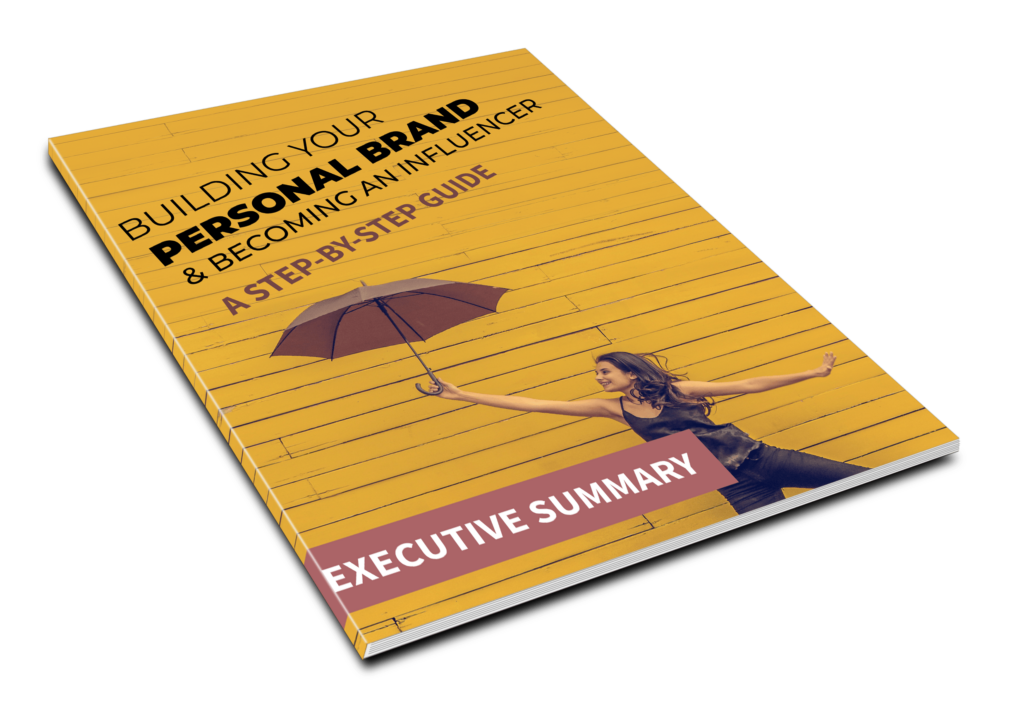Understanding brands like McDonald’s and Apple is common, but grasping the concept of a personal brand might not be as straightforward. If you’re unsure about what a personal brand is or how to develop one, this guide is tailored for you.
In today’s competitive landscape, establishing a strong personal brand is essential for attracting clients and growing a successful business. This is especially true for entrepreneurs, for whom a personal brand is a vital asset that can propel your business to new heights.
Many business owners struggle with the concept of personal branding, unclear on the steps needed to create a brand that truly represents them. This report aims to demystify the process, offering a clear roadmap to understanding, creating, and leveraging your personal brand for success.
Let’s get started.

Defining a Personal Brand
A personal brand transcends mere aesthetics like logos or color schemes; it’s the essence of who you are and what you do. It represents how you present yourself to your ideal audience, both online and offline, encompassing your values, unique skills, experiences, stories, personality, and image. It’s about authenticity and the unique value you offer, solving your audience’s challenges in your distinctive way.
Contrary to the belief that only big companies can be brands, the digital age and social media have democratized branding. Today, every individual has the potential to be their own brand, continuously engaging with their audience and shaping their perception.
Your personal brand will exist regardless of your effort, shaped by every interaction, post, and communication you partake in. The key question is whether you let it grow organically, possibly in undesired directions, or actively guide it to represent the best version of yourself.
Opting for control means deliberately building your brand to support your business and personal goals. This report aims to guide you through actively crafting and controlling your personal brand to ensure it works for you.
The Importance of Building a Personal Brand
You might wonder why a personal brand matters if you’re not a big corporation or a celebrity. The truth is, every professional, whether an entrepreneur, coach, consultant, or freelancer, benefits significantly from cultivating a personal brand. Here’s why:

Stand Out from the Competition:
Your unique experiences, strengths, beliefs, perspectives, and skills make you irreplaceable. Highlighting these aspects sets you apart, giving you a competitive edge.
Charge Premium Prices:
A strong personal brand showcases you unique value, allowing you to command higher fees for your exclusive services.
Establish Your Expertise:
Sharing valuable content across various platforms proves your industry knowledge, building trust and establishing you as a thought leader.
Attract Your Ideal Audience:
Being recognized as an expert draws your target audience to you, increasing referrals and allowing you to charge expert-level prices.
Control Your Narrative:
Intentionally shaping your personal brand lets you influence how others perceive you, ensuring your brand reflects who you want to be.
Increase Visibility:
A growing personal brand enhances your social media presence, media coverage, and speaking opportunities, creating a virtuous cycle of brand and platform growth.
Guide Your Content Strategy:
A clear personal brand provides direction on what content aligns with your values and enhances your brand, avoiding off-brand distractions.
Forge Stronger Connections:
People resonate more with individuals than companies. A personal brand fosters deeper connections, opening up more business opportunities.
Become an Influencer:
Developing your personal brand positions you as an influencer, attracting partnerships, freebies, and media opportunities.
The Power of Personal Branding: Your personal brand is a key differentiator and asset in today’s crowded market. It not only helps you stand out but also connects you with the right people, opportunities, and allows you to command the value you truly deserve. Embracing your personal brand is embracing the path to success.
Are you ready to take control and build your personal brand?
Crafting Your Personal Brand
Building a personal brand involves a strategic approach to showcasing your authentic self. Here’s how to do it:

1. Understand Yourself:
Your personal brand should reflect your genuine skills, passions, values, and beliefs. Ask yourself about your unique skills, core values, passions, defining experiences, how you can serve your audience, and what sets you apart.
2. Set Your Goals:
Define what you aim to achieve with your personal brand, both personally and professionally. Consider what you want to be known for, your dream expertise area, the key message you wish to communicate, and the singular piece of advice you’d offer.
3. Identify Your Audience:
Recognize that you can’t cater to everyone. Determine your target demographic by understanding who can benefit most from your offerings and who you’re most passionate about serving. Creating a detailed persona of your ideal client can be incredibly helpful.
4. Craft Your Unique Value Proposition (USP):
Summarize your brand into a compelling statement that encapsulates who you are and how you assist your audience. This should merge your identity, goals, and audience understanding into a memorable and impactful USP.
5. Live Your Brand:
Consistently embody your brand across all interactions. This includes maintaining a consistent message in communications, creating a professional website as your digital hub, and ensuring all content reflects your brand values and USP.
6. Optimize Your Website:
Your website should immediately communicate your USP, showcase professional imagery, feature compelling testimonials, and guide visitors towards a clear call-to-action. It’s your digital first impression and should be optimized accordingly.
7. Develop a Content Strategy:
Utilize the “Pillar Method” to create and disseminate brand-consistent content across multiple platforms. This involves crafting substantial “pillar” content that can be broken down into smaller pieces for wider distribution, ensuring a consistent brand message.
8. Provide Continuous Value:
Focus on delivering value through your content without immediate expectations of return. Your audience’s primary takeaway should be the value and insight you provide.
9. Foster a Community:
Building a community around your brand not only amplifies your message but also creates a network of mutual support and engagement. Consider starting a private group, hosting live events, or creating a membership site for deeper interaction.
By following these steps, you can develop a strong personal brand that resonates with your target audience, distinguishes you from the competition, and advances your professional goals.

It’s Time to Forge Your Personal Brand
The reality is unmistakable: you possess a personal brand by default. Every interaction and piece of content you share contributes to the shaping of this brand. It’s crucial to approach brand building with purpose and strategy.
As Kathy Klotz-Guest insightfully points out, “We all have a personal brand whether we think about it that way or not. So, let’s be intentional about it.”
Building a personal brand might seem daunting, but it’s entirely achievable with the right approach.
To recap our discussion:
Engaging in these practices will not only enhance your brand but also draw a dedicated following.
Don’t delay in taking the reins of your personal brand. Begin today! Your audience awaits your unique contributions. Embrace the journey of serving them, and the rewards will follow.
Happy Brand-building!
